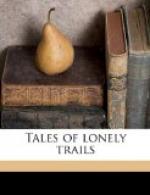My old guide on so many trips across the Painted Desert was in charge of the outfit. He was a wiry, gray, old pioneer, over seventy years, hollow-cheeked and bronzed, with blue-gray eyes still keen with fire. He was no longer robust, but he was tireless and willing. When he told a story he always began: “In the early days—” His son Lee had charge of the horses of which we had fourteen, two teams and ten saddle horses. Lee was a typical westerner of many occupations—cowboy, rider, rancher, cattleman. He was small, thin, supple, quick, tough and strong. He had a bronzed face, always chapped, a hooked nose, gray-blue eyes like his father’s, sharp and keen.
Lee had engaged the only man he could find for a cook—Joe Isbel, a tall, lithe cowboy, straight as an Indian, with powerful shoulders, round limbs, and slender waist, and Isbel was what the westerners called a broncho-buster. He was a prize-winning rider at all the rodeos. Indeed, his seat in the saddle was individual and incomparable. He had a rough red-blue face, hard and rugged, like the rocks he rode over so fearlessly, and his eyes were bright hazel, steady and hard. Isbel’s vernacular was significant. Speaking of one of our horses he said: “Like a mule he’ll be your friend for twenty years to git a chance to kick you.” Speaking of another that had to be shod he said: “Shore, he’ll step high to-morrow.” Isbel appeared to be remarkably efficient as camp-rustler and cook, but he did not inspire me with confidence. In speaking of this to the Doyles I found them non-committal on the subject. Westerners have sensitive feelings. I could not tell whether they were offended or not, and I half regretted mentioning my lack of confidence in Isbel. As it turned out, however, I was amply justified.
Sievert Nielsen, whom I have mentioned elsewhere, was the fourth of my men.
Darkness had enveloped us at supper time. I was tired out, but the red-embered camp-fire, the cool air, the smell of wood-smoke, and the white stars kept me awake awhile. Romer had to be put to bed. He was wild with excitement. We had had a sleeping-bag made for him so that once snugly in it, with the flaps buckled he could not kick off the blankets. When we got him into it he quieted down and took exceeding interest in his first bed in the open. He did not, however, go quickly to sleep. Presently he called R.C. over and whispered: “Say, Uncle Rome, I coiled a lasso an’ put it under Nielsen’s bed. When he’s asleep you go pull it. He’s tenderfoot like Dad was. He’ll think it’s a rattlesnake.” This trick Romer must have remembered from reading “The Last of the Plainsmen,” where I related what Buffalo Jones’ cowboys did to me. Once Romer got that secret off his mind he fell asleep.
The hour we spent sitting around the camp-fire was the most pleasant of that night, though I did not know it then. The smell of wood-smoke and the glow of live coals stirred memories of other camp-fires. I was once more enveloped by the sweetness and peace of the open, listening to the sigh of the wind, and the faint tinkle of bells on the hobbled horses.




